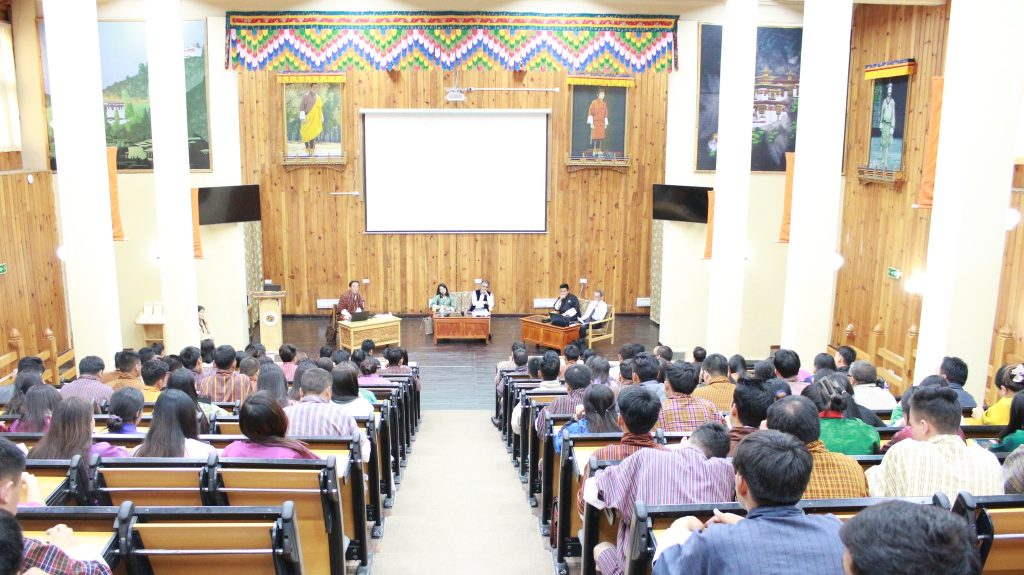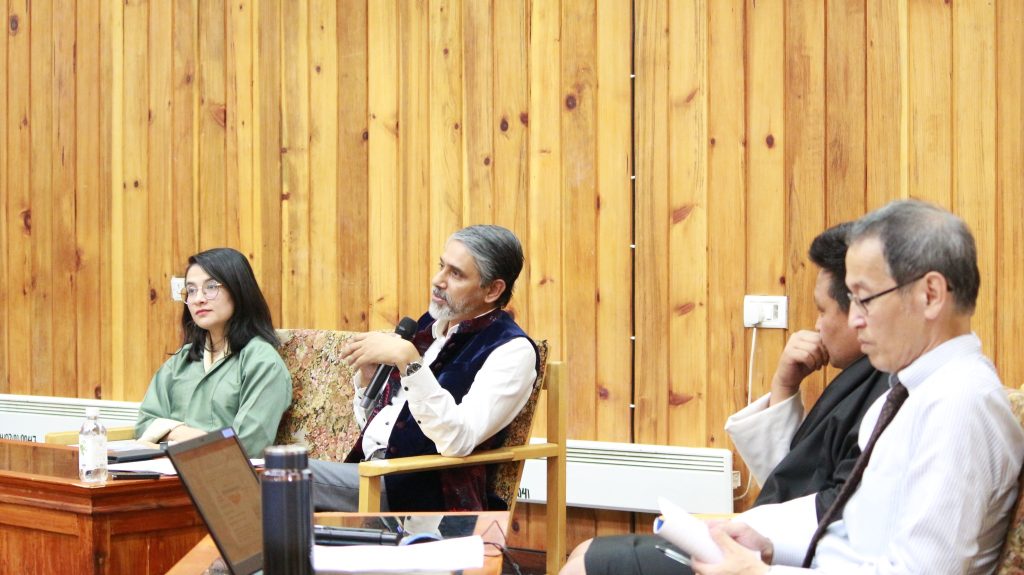An Era of Transformation- Report on the second Conversation, held in PCE, Paro

The second Suja & Dzaw Conversation on the 19th (spring) issue of the Druk Journal, themed “An Era of Transformation,” took place on 31st July 2024, at the Paro College of Education (PCE). About 170 participants attended the Conversation, including students and faculty of PCE, faculty from Norbuling Rigter College, members of political parties, and faculty members of the JSW School of Law. The Conversation featured insights from four contributors on Bhutan’s ongoing transformation: Mr. Khurshid Alam (Deputy Resident Representative, UNDP Bhutan), Mr. Katsu Masaki (Faculty of Konan University, Japan), Ms. Pallavi Sharma (Marketing and Communications, DHI), and Mr. Tshering Nidup (Programme Lead, Druk Gyalpo’s Institute). The discussion was moderated by the Editor of The Druk Journal, Dasho Kinley Dorji.

Speaker 1: Mr. Khurshid Alam discussed insights from the UNDP Human Development Report, emphasising the paradox of our time. Despite living in the wealthiest and most technologically advanced era, the global society is stuck in a gridlock, unable to find solutions to its most pressing problems. He highlighted how polarisation of ideas contributes to political unrest and record-high military spending. Additionally, he pointed out the uneven recovery from the COVID-19 pandemic, where wealthier countries have bounced back faster than least developed nations, exacerbating global and societal inequalities. As a result, he noted that six out of seven people are grappling with anxiety and fear about the future, with many losing trust in institutions and feeling powerless, even in democratic societies.
Speaker 2: Mr. Katsu Masaki underscored the crucial role that the community plays in driving Bhutan’s progress. He endorsed the idea of weaving community-driven initiatives—like cooperatives and local investments—into the fabric of development efforts to ensure fairness and inclusivity. Masaki-san emphasised that Bhutan should blend traditional wisdom with contemporary innovations, a strategy that resonates with the Gross National Happiness (GNH) philosophy, fostering a development path that is both balanced and inclusive.
Speaker 3: Ms. Pallavi Sharma’s discussion centred on the impact of digitalisation on governance and society at large. She introduced the concept of the National Digital Identity (NDI), emphasising its role in fostering trust within the digital ecosystem. The NDI initiative aims to make digital services more accessible, not only to government entities but also to businesses and individuals. Ms. Pallavi highlighted the importance of ensuring that all citizens, including those in remote areas, can participate equally in the digital economy. She also addressed the challenges related to trust and data security in digital transactions, which are critical for the success of the NDI project.
Speaker 4: Mr, Tshering Nidup from the Druk Gyalpo’s Institute explained the Bhutan Baccalaureate system which aims to provide a holistic education model rooted in Bhutanese values. He emphasised the need to integrate humanities with STEM education and break down educational silos to foster collaborative learning environments. Mr. Tshering stressed the importance of transforming the current education system to reflect His Majesty The King’s vision and address real-world issues effectively.
The Conversation yielded several questions and key recommendations from the audience, specifically around the Bhutan NDI app and the Bhutan Baccalaureate:
Cybersecurity and Data Protection Concerns
● There were strong concerns regarding the safety and privacy of personal information within digital systems. Participants expressed their apprehension and concerns about how their data might be used or potentially misused, emphasising the importance of robust cybersecurity measures and transparent data protection policies.
Inclusion and Infrastructure Challenges
● Bhutan NDI (National Digital Identity) is taking proactive steps to address digital inclusion, particularly for individuals who lack access to smartphones or the internet. Recognising that a significant portion of the population might be excluded from digital services, NDI is developing a version of their app for lightweight feature phones through the KaiOS operating system, which is more accessible to people with basic devices.
● For those without any internet access, Bhutan NDI plans to issue a physical card embedded with a dense QR code. This innovative solution will allow individuals to authenticate their identity in digital systems without needing an internet connection or exposing personal information, thereby ensuring broader access to digital services.
Mandatory Registration for the NDI App
● While registration for the NDI app is not mandatory, it is becoming increasingly essential for accessing a wide range of digital services from both private and government sectors. The app is set to become a central tool in Bhutan’s digital ecosystem.
● Despite this push towards digital identity, manual processes will continue to be available for those who choose not to register for the app. However, those who opt out may find it more challenging to engage with certain services, highlighting a potential digital divide.
Concerns about State Surveillance and Data Decentralisation
● There was significant discussion around the potential for state surveillance and the risks associated with centralised data storage. To mitigate these concerns, the NDI system has been designed to store personal data in a decentralised manner. This means that data is primarily kept on individual devices rather than being aggregated in a central cloud server.
● The decentralised structure is intended to reduce the risk of mass data breaches and protect user privacy. However, participants noted that certain legal processes might still necessitate access to specific digital activities, raising questions about the balance between security, privacy, and the need for oversight.
User Experience and App Improvements
● Initial feedback on the NDI app highlighted challenges with its facial recognition technology, which some users found difficult to use. In response, the NDI team has made significant improvements to enhance the app’s functionality and user-friendliness.
● The commitment to continuous improvement reflects the broader goal of ensuring that the app remains accessible and efficient for all users, supporting the transition to a more digitally inclusive society.
Broader Societal and Educational Transformations in Bhutan:
● The Bhutan Baccalaureate initiative was discussed as a transformative approach to education in the country. This initiative emphasises a holistic education model, focusing not just on academic success but also on spiritual, emotional, physical, and cerebral growth. The goal is to cultivate well-rounded individuals who are equipped to thrive in various aspects of life.
● There was also a critique of the over-reliance on standardised testing within education systems. Participants advocated for an educational approach that prioritises adaptability, curiosity, creativity, and other humanistic qualities over rigid academic metrics. This reflects a desire to foster a more flexible and innovative mindset among Bhutan’s youth.
● The discussion also touched on Bhutan’s potential to contribute uniquely to the global community. The country’s emphasis on social development, emotional resilience, and holistic well-being positions it as a potential leader in these areas on the world stage. This perspective encourages Bhutan to leverage its cultural and educational strengths to make significant contributions globally, particularly in areas where it can offer distinct insights and approaches.
Background:
The Druk Journal is a journal of thoughts and ideas focussing on issues of importance to Bhutan. Each edition of the journal is accompanied by conversations on the theme to trigger public discourse on matters of importance. This current issue of the journal “An Era of Transformation” has been released and widely distributed across the country.
Past issues have covered National Identity, Modernity, Youth matters and Youth aspirations, concerns, and mandates, Transforming the Economy, Post-Covid Bhutan, Democracy Today, etc. Our issues for 2022 were on Democracy today, Local Government, and Politics
and Elections in Bhutan.
You may order these past issues and also subscribe for a copy of the journal at the website www.drukjournal.bt. Copies are available in the Thimphu public library, college libraries, and high schools.
